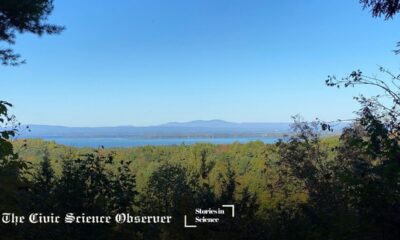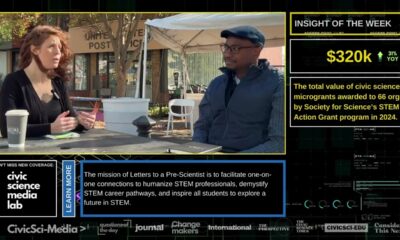Stories in Science Special Series
Playing in the Dirt and Calling it Science

– By Stephanie Halmhofer | Bioarchaeologist –
[dropcap]F[/dropcap]or some, the line from point A to point B is fairly straight. For others, it’s a zig-zag. I am definitely a zig-zagger. I didn’t find an easy, straightforward path into becoming a bioarchaeologist. To be honest, I don’t think any “easy” path in any career actually exists. Nor should there be one. Every mistake, rejection, challenge, and disappointment we face offers us teaching moments that we need to learn to recognize. More importantly, we need to learn how to use them to better ourselves.
My path into science began as a kid growing up with parents who encouraged my interest in science. From weekly science camps to science fairs and visiting Science World, my parents planted that science seed in my mind. Yet a career in science didn’t jump out at me until halfway through my first university degree. While doubting my choice of criminology I had the opportunity to take courses in archaeology and forensic anthropology. Following writing a term paper on the Franklin Expedition, I knew I wanted to be a bioarchaeologist.
To say planning for grad school was mentally defeating would be an understatement. But still, I persevered and, before I knew it, my hard work finally began to pay off.
Halfway through my Bachelor’s degree I transferred to a different university in a different province that would give me better bioarchaeological course options. With that came enormous financial and emotional difficulties. There were definitely periods of self-doubt and many nights wondering whether or not I was making the right choice. My retail job barely paid enough to cover rent, let alone rent plus tuition and associated school costs. And because I was working 40 hours a week between a full course load, my grades admittedly took a bit of a hit, which made me less competitive for scholarships. With support and encouragement from my husband and family, I stuck with it. I decided that if I was going to face these hardships I was going to work hard to overcome them and make sure I came out on top.

Steph Halmhofer
Bioarchaeology is a field that relies just as much on outside field learning as it does lab and classroom learning. You need to learn how to apply what you’ve learned in the classroom to your field site. Which can be in a natural environment. With wildlife. For example, I recently had a bear and her cub walk into the middle of the site I was working on. Classes definitely didn’t teach me how to react to their surprise visit! I looked for and actively pursued any volunteer and work opportunity I could to gain the experience I needed. It certainly wasn’t easy, but I’ve already mentioned that I’m a zig-zagger.
Following my undergrad, I decided to take a break and seek work within the field. Though I knew I wanted to go to graduate school, I also wanted more field experience and knowledge. My voluntary one year away from school involuntarily turned into nearly five years away, working in three different provinces across Canada. Though I still feel there were more pros than cons associated with the choices I made, it was still fraught with challenge. Some projects ended too early and left me scrambling for work. Others lasted longer but kept me away from home for longer.
Some I had to turn down because I couldn’t afford the associated costs. Others added to the existing school debt I was trying to pay off. At first, I delayed grad school applications because I was worried I couldn’t afford going back to school. Then the struggle turned to finding a supervisor who would recognize my capabilities as demonstrated by my work experience and not my grades. To say planning for grad school was mentally defeating would be an understatement. But still, I persevered and, before I knew it, my hard work finally began to pay off.
At times of self-doubt, I pull out my C.V. I see the two years I spent working for an amazing archaeology lab, which was not only my first archaeological collections job but also led to an undergraduate research award. I see the volunteer work I did in two different labs which, along with the earlier lab work, led to two summer positions working in wonderful little museums and developed my collections research skills. I see when I was hired onto a large, multi-year archaeological project before I even graduated with my BA. I see the field skills, knowledge, and supervisory experience I gained from that work, which led me into the bioarchaeological work in British Columbia I started three years ago.
I see how that work led to me being invited onto an incredible, collaborative research project I’ve been part of for three years. I see how that work led to me beginning my Master of Arts degree at a fantastic university with an influential supervisor who recognized my skills and knowledge and saw my potential. And now, as I sit here one month away from completing my M.A. as a first-generation scientist, I can see my first major post-graduate collaborative project beginning to develop.
I will always be open and honest about my hardships in pursuing my career. However, I’ll never use them as a reason to tell others not to pursue science. For every hardship I’ve faced, I’ve also found success. I’ve got a wonderful support system from my husband and my family which, along with my own stubbornness, has kept me going at the toughest of times. At the end of the day, all these experiences have come together to make me into the bioarchaeologist I am today and one I can be proud of. I love what I do. I get to play in the dirt and call it science.
Visit Stephanie Halmhofer’s website HERE
The CS Media Lab is a Boston-anchored civic science news collective with local, national and global coverage on TV, digital print, and radio through CivicSciTV, CivicSciTimes, and CivicSciRadio. Programs include Questions of the Day, Changemakers, QuickTake, Consider This Next, Stories in Science, Sai Resident Collective and more.

-
Audio Studio1 month ago
“Reading it opened up a whole new world.” Kim Steele on building her company ‘Documentaries Don’t Work’
-
 Civic Science Observer1 week ago
Civic Science Observer1 week ago‘Science policy’ Google searches spiked in 2025. What does that mean?
-
Civic Science Observer1 month ago
Our developing civic science photojournalism experiment: Photos from 2025
-
Civic Science Observer1 month ago
Together again: Day 1 of the 2025 ASTC conference in black and white
Contact
Menu
Designed with WordPress
























